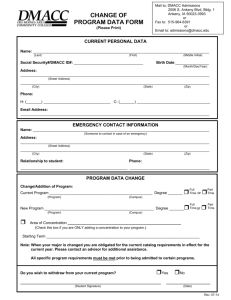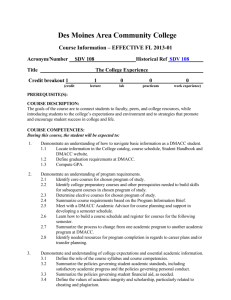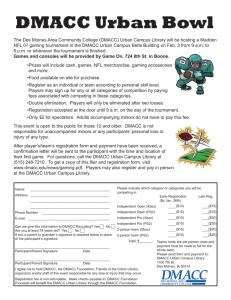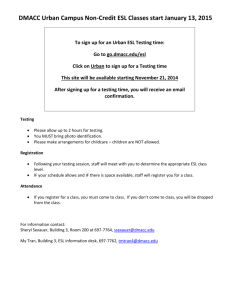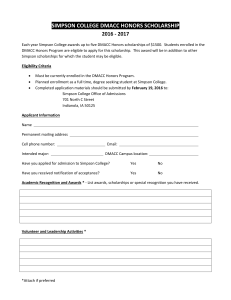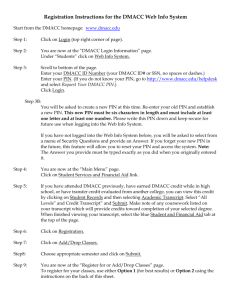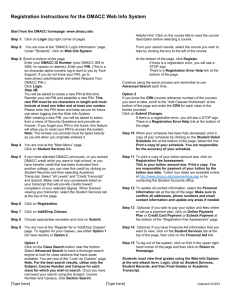Hard copy of the syllabus
advertisement
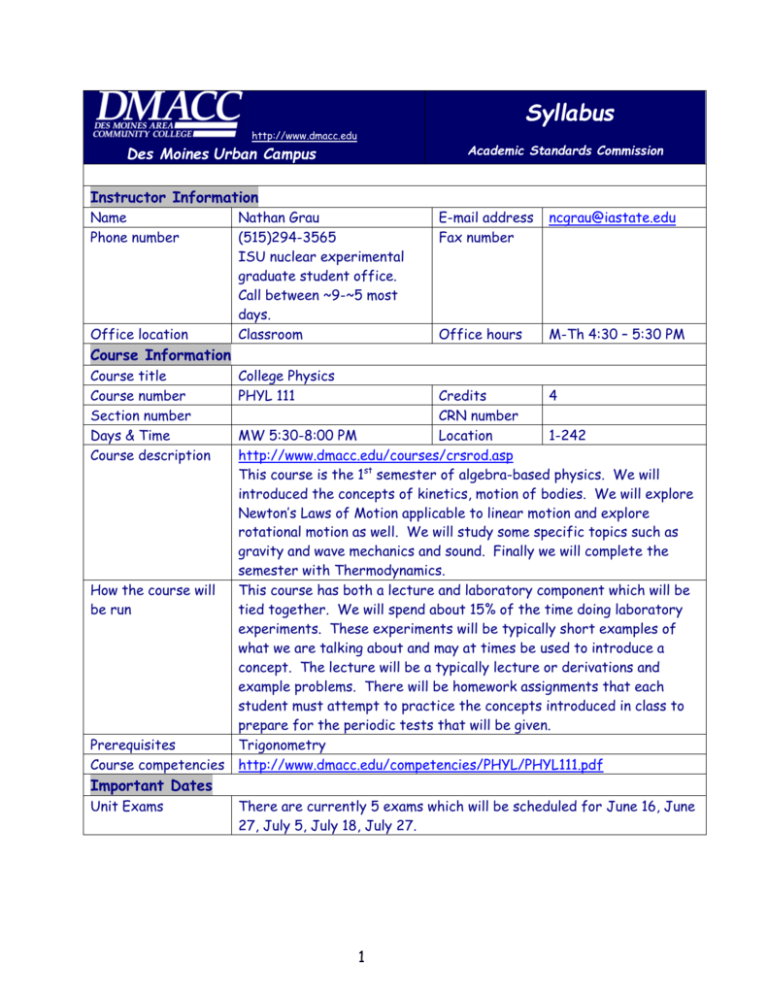
Syllabus http://www.dmacc.edu Academic Standards Commission Des Moines Urban Campus Instructor Information Name Phone number Office location Nathan Grau (515)294-3565 ISU nuclear experimental graduate student office. Call between ~9-~5 most days. Classroom E-mail address Fax number ncgrau@iastate.edu Office hours M-Th 4:30 – 5:30 PM Course Information Course title Course number Section number Days & Time Course description College Physics PHYL 111 Credits 4 CRN number MW 5:30-8:00 PM Location 1-242 http://www.dmacc.edu/courses/crsrod.asp This course is the 1st semester of algebra-based physics. We will introduced the concepts of kinetics, motion of bodies. We will explore Newton’s Laws of Motion applicable to linear motion and explore rotational motion as well. We will study some specific topics such as gravity and wave mechanics and sound. Finally we will complete the semester with Thermodynamics. How the course will This course has both a lecture and laboratory component which will be be run tied together. We will spend about 15% of the time doing laboratory experiments. These experiments will be typically short examples of what we are talking about and may at times be used to introduce a concept. The lecture will be a typically lecture or derivations and example problems. There will be homework assignments that each student must attempt to practice the concepts introduced in class to prepare for the periodic tests that will be given. Prerequisites Trigonometry Course competencies http://www.dmacc.edu/competencies/PHYL/PHYL111.pdf Important Dates Unit Exams There are currently 5 exams which will be scheduled for June 16, June 27, July 5, July 18, July 27. 1 Midterm Final http://www.dmacc.edu/academiccal.asp There will not be an exam given for the midterm but progress reports for students not attending class or receiving less than a C grade will be reported at this time. http://www.dmacc.edu/academiccal.asp The final exam will be the final unit test and will be given on Wednesday July 27th. Textbooks & Materials Required textbooks Required materials Software applications Software notice Physics 2nd Edition by James S. Walker It is necessary to have a calculator that will calculate trigonometric functions, logarithms, and have an `e’ key. Some software may be used in the laboratories but it will be provided. “All the software used in this class is copyrighted; therefore, it is not for distribution, copying, or personal use. This software is the property of Des Moines Area Community College.” Course Policies Attendance Grading criteria Missed exams Late assignments There is one point given for each class attendance which will make up 5% of your grade. There will be no make-up laboratories because of my schedule so a missed lab is missed points. 5 unit tests = 12% each x 5 = 60% homework assignments = 20% laboratories = 15% in-class tutorial assignments = 5% Typically the average grade in a physics course is 70% and the average test scores can sometimes dip into the 60% range. Because of this it is difficult to set in stone > 90% is an A, 80-90% is a B. With the number of people in the class most will get a B which will contain the average grade. Those well above the average will receive an A, those below will score below a B. This scale will be decided ultimately after the final exam. I will show you distributions throughout the semester giving approximate divisions of the A,B,C, and D grades at that time. Exams will not be made up. If you know ahead of time that you will not be in class on the day of a test, we can arrange a time for you to take the exam BEFORE the rest of the class. No late homework will be graded. 2 Study expectations Classroom/Lab policies Weather policy Academic dishonesty The only expectations that I have from you that I will be explicit about is that you work hard when you are in class. We will spend a lot of time individually and in groups working on labs, tutorials, and problem solving. The harder you work in class the less hard you will have to work outside of class. Our classroom is a lab and for your safety and for others please do not eat in the lab. We will have a 10 minute break every class period if you wish to eat outside the lab. Also, no cell phones, ipods, portable gaming systems, etc. “Individual circumstances such as health, childcare, rural roads, distance from the College, etc. can vary greatly among students and staff. It is always DMACC’s goal to provide safe learning conditions, as well as provide the opportunity for students to attend classes when the vast majority is able to safely attend. The final decision to come to College can only be made by the individual student based on their specific extenuating circumstances that may make it unsafe for them to travel. During adverse weather, DMACC faculty is considerate of students who are unable to attend classes due to unique extenuating circumstances. It is the responsibility of each faculty member to notify their students (in addition to their dean or provost) thru some predetermined means if they are must postpone or cancel a specific class due to weather or illness.” In the case that class is canceled for some reason I will email everyone in class. “See DMACC Educational Services Procedures ES 262 VII. A. and B” for information on plagiarism, cheating, information about appeals procedures or reference publication that addresses this information in detail.” In the hope that you and your classmates will collaborate on homework assignments, there is a possibility that academic dishonesty can occur. Academic dishonest will not be tolerated though I sincerely doubt that we will have trouble with this. In the unfortunate case that I feel a student has cheated, copied, etc., I must set up some repercussions. In the case of copying homework assignments no credit will be given to any student which I deem has copied. If I suspect that you have copied a second time you will receive an F for the course. In the case of cheating on an exam, you will receive an F for the course. DMACC Information Web Sites DMACC home page http://www.dmacc.edu/ 3 Instructor home pages Admissions & registration Cellular phone use statement Student handbook Add/drop dates Refund policy http://www.dmacc.edu/instructors/welcome.asp Soon I will have a web page for this course… http://www.dmacc.edu/potienti.asp http://www.dmacc.edu/student_services/cellphone.asp No cell phones in class. http://www.dmacc.edu/handbook/welcome.asp http://www.dmacc.edu/registration/add_drop.asp http://www.dmacc.edu/refund.asp After 1st week – all After 2nd week – ¾ After 3rd week – ½ After 4th week and beyond – None Support Services Accommodations Services for students with disabilities Academic & educational advising Career counseling Library “It is the policy of DMACC to accommodate students with disabilities. Any student with a documented disability who requires reasonable accommodation should contact the special needs coordinator at 515964-6850 voice or 515-964-6810 TTY.” http://www.dmacc.edu/student_services/disabilities.asp Contact the special needs coordinator at 515-964-6850 voice or 515964-6810 TTY or contact the counselor on the Urban campus at 515697-7717 for an Application for Accommodation. http://www.dmacc.edu/urban/AC2SMtemplate.asp http://www.dmacc.edu/urban/ACSMtemplate.asp http://www.dmacc.edu/urban/library.asp Room 122 Monday – Thursday 8:00 am to 9:00 pm Friday 8:00 am to 4:30 pm Saturday 8:00 am to 12:00 pm 4 Academic Achievement Center http://www.dmacc.edu/urban/tutoring.asp Services include academic help, tutoring, GED, testing (Compass), preadmission courses, high school diploma courses, and several credit classes. 515-248-7204 or 1-800-362-2127 Computer labs Room 204/206/208 Monday – Thursday 8:30 am to 7:00 pm Friday 8:30 am to 2:30 pm Saturday 9:00 am to 1:00 pm (fall & spring semesters only) http://www.dmacc.edu/helpdesk/pc_labs.htm Room 202 Monday – Thursday 8:00 am to 9:30 pm Friday 8:00 am to 4:00 pm Saturday 8:00 am to 1:00 pm Rooms 215 Monday – Thursday 8:00 a.m. to 9:30 p.m. Friday 8:00 a.m. to 4:30 p.m. Saturday 8:00 a.m. to noon Disclaimer “This syllabus is representative of materials that will be covered in this class; it is not a contract between the student and the institution. It is subject to change without notice. Any potential exceptions to stated policies and requirements will be addressed on an individual basis, and only for reasons that meet specific requirements. If you have any problems related to this class, please feel free to discuss them with me.” Course Schedule Week or Date June 1 June 2 June 6 June 7 Topic and Textbook Section Units/Conversion/Significant Figures (Chapter 1) Introduction to Mechanics (Chapter 2) Lab Measurement, Accuracy, Calculation 1-d Mechanics (Chapter 2) Vectors (Chapter 3) 2-d Mechanics (Chapter 4) 2-d Mechanics (Chapter 4) Acceleration Free Fall 5 Rectilinear Motion June 8 June 9 June 13 June June June June June 14 15 16 20 21 June June June June June 22 23 27 28 29 June 30 July 4 July 5 July 6 July 7 July 11 July 12 July 13 July 14 July 18 July 19 July 20 July 21 July 25 July 26 July 27 2-d Mechanics (Chapter 4) Newton’s Laws (Chapter 5) Newton’s Laws and Application (Chapter 5 and 6) Applications of Newton’s Laws Work (Chapter 7) Test #1 Kinetic Energy (Chapter 7) Potential Energy Energy Conservation (Chapter 8) Momentum Conservation Rotational Kinematics (Chapter 10) Test #2 Rotational Kinematics (Chapter 10) Rotational Dynamics and Equilibrium (Chapter 11) Rotational Dynamics and Equilibrium (Chapter 11) Gravity (Chapter 12) Test #3 Waves (Chapter 13) Sound (Chapter 14) Sound (Chapter 14) Fluids (Chapter 15) Fluids (Chapter 15) Temperature and Heat (Chapter 16) Test #4 Temperature and Heat (Chapter 16) Phase Changes (Chapter 17) Phase Changes (Chapter 17) Laws of Thermodynamics (Chapter 18) Laws of Thermodynamics (Chapter 18) Catch up day Test #5 6 Projectile at an Angle 2nd Law of Motion Composition of Forces Friction Momentum Lab Center of Gravity Pendulum Standing Waves Speed of Sound Specific Heat Latent Heat of Fusion/Vaporization
